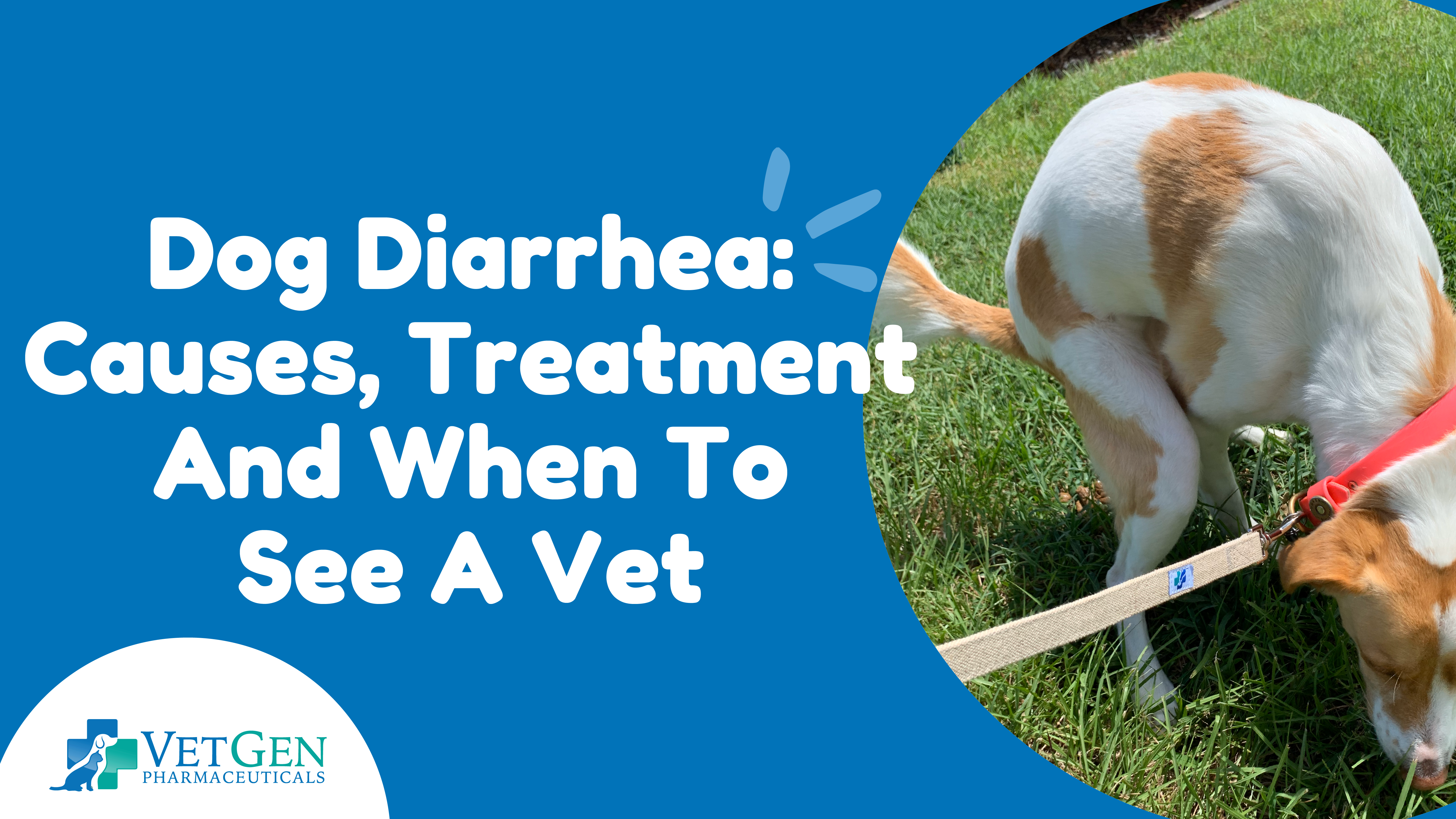Dog diarrhea is one of the most common issues people like us pet owners face. It can be anything from food poisoning to contagious diseases. A weak bowel can also be a cause of loose stool. However, if the symptom is chronic and the dog is lethargic, it is better to see a vet.
This blog intends to talk about the points behind dog diarrhea and when it becomes too serious that the dog should be taken to the vet. The blog post will also touch on the simplicity of treatment and preventive measures.
What Are The Causes of Dog Diarrhea
Diarrhea in dogs can be caused due to various reasons, starting from what your dog ate to more complex health conditions. You must get to the root of the problem to better understand your pet’s health.
Dietary Causes
Some dogs are allergic to certain ingredients in their diet that may trigger the immune response system causing gastrointestinal upset and diarrhea.
Dogs will eat the strangest things like garbage, spoiled foods, or toxic items that have gone bad causing tummy problems.
Regularly switching your dog’s food can also surprise their digestive system because the body needs to adjust to the new diet.
Infectious Causes
Bacteria like Salmonella or E. coli can cause food-borne illness and become a leading cause of death in dogs. It usually sets off an immune response that produces severe diarrhea as it tries to let out waste.
Highly contagious viruses like parvovirus and distemper can cause severe diarrheal problems in young dogs.
Intestinal parasites, such as Roundworms and Hookworms in the intestines cause diarrhea by interfering with normal digestion.
Medical Conditions
Inflammatory bowel disease is an autoimmune disorder where the immune system attacks the digestive tract to cause diarrhea.
Pancreatic EPI is a condition where the pancreas does not have enough enzymes causing maldigestion and diarrhea.
Liver dysfunction fails to correctly digest and absorb the nutrients. This can cause diarrhea.
Kidney problems may arise that will allow the release of waste materials out of your dog’s body.
Other Causes
Emotional stress or anxiety can cause diarrhea because it can affect the dog’s digestive system.
Diarrhea can also happen when the balance of bacteria in your colon becomes disrupted due to medications, especially antibiotics.
Generally, dogs chew and swallow non-food items that could obstruct the digestive tract or irritate the dog’s stomach. The dog will spit it out in the form of diarrhea.

Symptoms and Diagnosis
The symptoms and diagnosis for determining the severity of the condition and the appropriate course of action. Here’s a brief overview of what to look for and how veterinarians diagnose the problem.
Primary Symptoms
Loose or watery stools: Diarrhea is most often recognized by the change in a partial to full-on watery stool consistency.
Increased frequency of bowel movements: If your dog has to poop more often, it is a sign that something in his gastrointestinal system (gut) is not right.
Urgency to defecate: A sudden, urgent need to have a bowel movement may be indicative of diarrhea.
Secondary Symptoms
Dehydration: Constant diarrhea can lead to dehydration. Signs of dehydration are marked by sunken eyes and dry gums. You’ll also see that your dog is feeling tired all the time.
Vomiting: If there is vomiting as an accompaniment to the diarrhea it may indicate a serious problem that needs immediate attention.
Loss of appetite: If a dog refuses to eat, it might be because of stomach upset or some other underlying condition.
How To Treat Your Dog’s Diarrhea?
When it comes to dogs’ diarrhea, you have to deal with three main aspects. Those are immediate attention, medicines, and long-term solutions so that it will not occur again.
Immediate Care
Don’t give your pet constant food. A little rest for one day without food is like a cure for the pet. Gradually, the symptoms of diarrhea and vomiting will decrease. You should give plenty of water in the meantime to keep him hydrated.
When you feel that your dog is getting better, you can introduce small amounts of normal food (boiled chicken and rice) to your dog.
Medications
While antidiarrheal drugs can be used to prevent diarrhea, they are prescribed to pets with diarrhea as well. But let the vet give the drugs.
Probiotics help maintain the natural balance of gut flora. These bacteria stimulate the immune system and return the dog’s intestinal flora to their original state.
If a bacterial infection is causing diarrhea in your dog, antibiotics can help remove the harmful bacteria. Similarly, deworming medications can help relieve symptoms of parasitic infection.
How Do I Know if My Dog's Diarrhea is Serious?
If your dog’s diarrhea lasts more than 24-48 hours, it is a sign of caution. Continuous diarrhea is believed to be the first indication of dehydration and it is a signal of a hidden problem.
With diarrhea comes severe vomiting as well. This can be a sign of stress or digestive discomfort in your dog. You need to keep checking your dog’s temperature. If it’s above 103°F or 39.4°C, it’s a reason to worry.
Special Considerations
Some dogs require extra attention when they are sick.
Puppies
Puppies get dehydrated more quickly than adult dogs. They need immediate attention or else things can get worse. Puppies have weaker immune systems so they are more prone to infections.
Senior Dogs
Older dogs can develop potential underlying chronic conditions such as kidney or liver disease that can contribute to diarrhea.
Breeds with Predispositions
Certain breeds like German Shepherds and Boxers are genetically predisposed to gastrointestinal problems like inflammatory bowel disease or exocrine pancreatic insufficiency.
Conclusion
Dogs frequently get diarrhea at some point in their lives for a variety of reasons. They may experience mild upset stomachs brought on by eating inappropriate food scraps or trying a new food brand. Dog diarrhea, however, can also be brought on by major medical issues. Just find out the cause and you can easily treat it within days.
If you wish to learn more about keeping your dog healthy, do visit Vetgen Pharmaceuticals.






